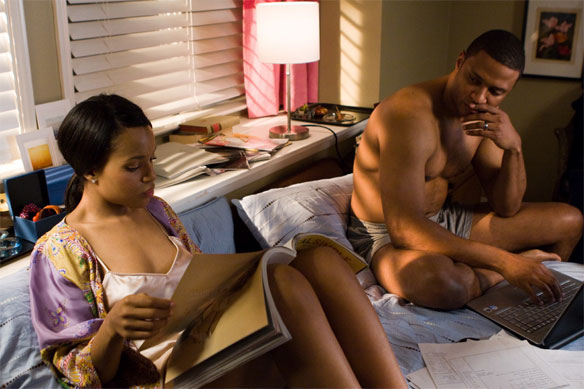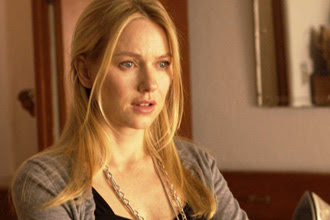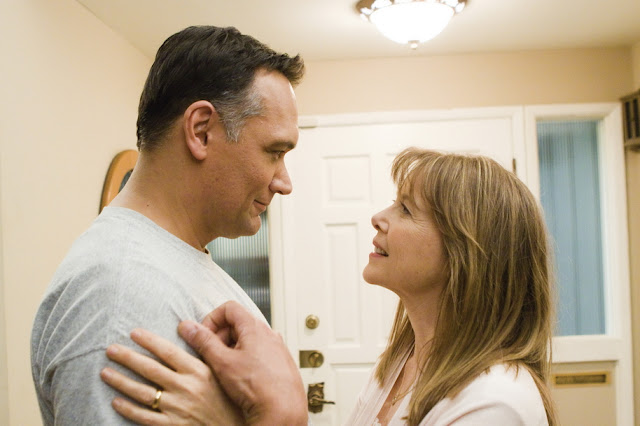 |
| Kerry Washington and David Ramsay in Mother and Child |
While many continue to castigate the HBO series, Girls, for its lack of female diversity (with good reason), I’d like to look back at a 2009 film which gave voices to an assortment of female characters, a gem that eloquently showed both the beauty and plight of motherhood in extraordinary fashion.
 |
| Shareeka Epps as Ray in Mother and Child, along with Washington |
In writer/director Rodrigo García’s
Mother and Child, something as complex and precious as motherhood is broken up into a kaleidoscope of elegant vignettes capturing the lives of several mothers—hopeful, expecting and recovering mothers.
Annette Bening stars as Karen, a woman who remains deeply affected by the baby she gave up for adoption as a pregnant teen. At 50 years old, childless, and significant other-less, Karen begins to feel the emptiness of the child she once carried. As she continues to take care of her dying mother, Nora (Eileen Ryan), who encouraged her decision to give her child to another, she feels her first pangs of regret exacerbated by years of resentment.
 |
| Annette Bening as Karen in Mother and Child |
Bening bestows the ornery characteristics we’ve all come to know and love from past performances in her vast oeuvre. But this particular role stands out in the natural way she sheds Karen’s bitter exterior, and finds the strength to move past the loss that’s been eating away at her. Her impressively nuanced portrayal by the end of the film brings the audiences to their knees even after pushing them away for the better course of the movie.
Part of that recovery to self is attributed to Jimmy Smits’ character Paco, Karen’s reluctant love interest, who sees more in Bening than she sees in herself. While Smits is very subtle in this role, the gentleness he brings to Paco is one that few critics remarked on but was pivotal to the emotional compass of Karen’s character (but does not define it).
 |
| Bening with Jimmy Smits as Paco in Mother and Child |
Kerry Washington plays Lucy, a married woman who’s unable to conceive a child of her own with her husband Joseph (David Ramsay). Desperate for motherhood, she dreams of being able to rock her very own baby to sleep at night. She thinks she’s finally found the child she’s always wanted from a young mother who’s putting her child up for adoption but, in a drastic change of events, her dream is snatched away from her. And it’s the single most devastating moment in the film, marked by a performance by Washington that’s so raw and heart wrenching that it would move even the most jaded viewer.
To me, this is Washington’s best performance to date, and it—as well as this film—goes entirely unnoticed, which is a crying shame. Her portrayal is crushing, real, and simply mesmerizing to watch unfold. The only comparable performance I can think of is that of Jennifer Garner in Juno, another performance that fell right through the critical cracks.
 |
| Samuel L. Jackson and Naomi Watts in Mother and Child |
The talent Washington brings to this role isn’t the only thing that’s wonderful about it. It’s the fact that her character is so relatable to watch. I’m not sure if García intentionally sought an African-American woman for this role, but Lucy’s story—like all the characters—is drawn in a way that every woman could appreciate. Also, García doesn’t shy away from highlighting black love onscreen. While mainstream Hollywood nowadays often ignores black love in films by neglecting it altogether by creating somewhat asexual black characters or only showing an interracial romantic angle (i.e. Will Smith and Eva Mendes in
Hitch, or Zoe Saldana and Michael Vartan in
Colombiana),
Mother and Child refuses to hide behind the Tinseltown taboo with Lucy’s character.
As a matter of fact, Lucy and Joseph are really the only married couple in the movie who are shown having sex. Though Lucy and Joseph don’t exactly have a happy fairy tale ending, at least we get to see a black couple getting busy. So yes, Hollywood, two black people do have sex. Passionate, unapologetic sex in a committed relationship, and it’s about time we see that again.
 |
| Naomi Watts as Elizabeth |
But let’s get back to some of the other characters. The eternally underrated Shareeka Epps (
Half Nelson) plays Ray, a pregnant teen who decides, mostly with her mother’s influence, to give her child up for adoption. While she awaits the birth of her baby, she mulls over the decisions she’s made and will make, decisions that will have a major impact on her life. She genuinely seems to be a good kid, but, like Karen, she seems to be conceding to the outcome of her actions, without really thinking about them. It’s a very subtle performance by a young talent who’s known for playing young women struggling with their own sense of identity, which works well for this role. In her performance here, you see the charm of her youth and the complexity of her womanhood.
This brings us to Naomi Watts’ Elizabeth, whose role we don’t fully learn until nearly the end of the movie. She touchingly steers the film full circle. But Elizabeth is a woman who’s suffering from bouts of desolation as an emotionless attorney at a law firm. She gets involved with Samuel L. Jackson’s character, Paul, a fellow attorney, and what happens next can only be described as a full realization of her own character, which leads her to make a decision that will not only change her life, but also Paul’s. This is the perfect role for Watts, whose quiet ferocity works well here simply because she tries to remain in such tight control of her life that when it begins to blossom, we finally get to see her heart.
 |
| Smits and Bening |
I’d be remised if I didn’t mention the ever talented Jackson. Yes, the guy who has been in a plethora of movies—both great and terrible—can file this particular performance under
great. The sensitivity and compassion he brings to Paul perfectly complements Elizabeth’s emotional impotence. Jackson aptly tucks away his signature swagger and wild fury found in many of his roles to reveal a softer side for Paul. He reminds is of why we fell in love with his talent in the first place. You can see the love in his eyes each time Elizabeth enters the scene, and it’s enough to crush your soul.
Alluring, delicate and simply exquisite to watch, Mother and Child tackles the inspiring and sometimes heartbreaking aspects of motherhood with a range of characters in which every woman, whether or not she’s a parent, can see themselves. Perfectly intertwined stories yield a gorgeous singular concept of love and maternal grace that steals your heart.
———-
Candice Frederick is an NABJ award-winning journalist, film critic, and blogger for Reel Talk. Follow her on twitter.







